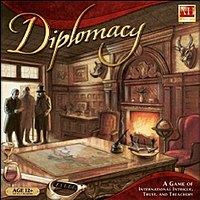Diplomacy (game)
 |
|
| Designer(s) | Allan B. Calhamer |
|---|---|
| Publication date | 1959 |
| Players | 2–7 |
| Age range | 12+ |
| Setup time | 5–10 minutes |
| Playing time | 4–12 hours |
| Random chance | None |
| Skill(s) required |
Tactics Strategy Psychology Negotiation |
Diplomacy is a strategic board game created by Allan B. Calhamer in 1954 and released commercially in 1959. Its main distinctions from most board wargames are its negotiation phases (players spend much of their time forming and betraying alliances with other players and forming beneficial strategies) and the absence of dice and other game elements that produce random effects. Set in Europe before the beginning of World War I, Diplomacy is played by two to seven players, each controlling the armed forces of a major European power (or, with fewer players, multiple powers). Each player aims to move his or her few starting units and defeat those of others to win possession of a majority of strategic cities and provinces marked as "supply centers" on the map; these supply centers allow players who control them to produce more units.
Diplomacy was the first commercially published game to be played by mail (PBM); only chess, which is in the public domain, saw significant postal (long distance) play earlier. Diplomacy was also the first commercially published game to generate an active hobby scene with amateur fanzines; only science-fiction, fantasy and comics fandom saw fanzines earlier. Competitive face-to-face Diplomacy tournaments have been held since the 1970s. Play of Diplomacy by e-mail (PBEM) has been widespread since the late 1980s.
Diplomacy has been published in the United States by Games Research, Avalon Hill, and Hasbro; the name is currently a registered trademark of Hasbro's Avalon Hill division. Diplomacy has also been licensed to various companies for publication in other countries. Diplomacy is also played on the Internet, adjudicated by a computer or a human gamemaster.
In its catalog, Avalon Hill advertised Diplomacy as John F. Kennedy and Henry Kissinger's favorite game. Kissinger described it as his favorite in an interview published in a games magazine. Authors Isaac Asimov and Ray Bradbury, and American broadcast journalist Walter Cronkite were also reported to be fans of the game.
...
Wikipedia
